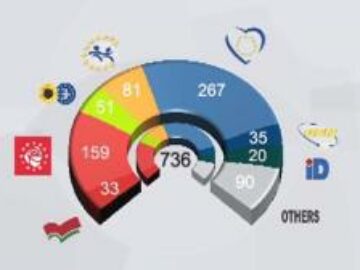Apathetic turnout gives centre-right victory

The centre right has come out on top in Europe after EU elections marked by a record low turnout and harsh lessons for ruling parties in some countries.
Partial results show the European People’s Party delivered a heavy blow to the Socialists and will remain the main group in parliament. The conservatives have strengthened their ability to set the agenda in the assembly that passes many of the European Union’s laws and its budget.
Results show the centre right as an overall winner in the European Parliament elections, set to gain 267 out of the parliament’s 736 seats.
The Socialist grouping the PSE gains 159 seats.
The alliance of Democrats and Liberals wins 81 seats and the Greens, coming fourth, have 51 seats.
The governing centre-right groups won in Germany, France, Poland and Italy, and Green parties did well on a bad night for the Socialists, who failed to cash in on widespread discontent with Europe’s handling of the global economic crisis.
Turnout was around 43 percent. Results showed ruling parties beaten or heading for defeat in some of the countries worst hit by the crisis — Britain, Ireland, Latvia, Greece, Hungary, Bulgaria and Spain.
The British National Party won its first two seats in the parliament and other far-right groups appeared to have gained in the Netherlands, Romania and Hungary. But they didn’t make as big an
impact as some political analysts had expected.
Voter turnout across Europe hit a record low and the centre-right swept the board in a welcome surprise result for German, Fench, Polish and Italian governments in particular.
Other centre left governments were badly hit, including Greece and the UK.
In Germany which has 99 seats in the parliament, the conservatives led by chancellor Angela
Merkel came out on top with 37.9% of the vote, ahead of the Social Democrats with a historic low of 20.8%.
In France, the conservative party led by president Nicolas Sarkozy won 28.3% ahead of the socialists with 16 to 16.8% of the vote. The Greens led by Daniel Cohn-Bendit meawhile made surprise gains.
In Italy, Silvio Berlusconi’s centre right party also won, with 36% of the vote, in spite of the recent scandals about his personal life.
In Spain the right also narrowly won out over the ruling Socialist Party led by Prime Minister José Luis Zapatero.
In Portugal the centre-right also enjoyed a surprise win. This is the home country of European Commission President José Manuel Barroso.
In the UK, the ruling socialist Labour party lead by Gordon Brown, suffered a huge defeat, coming third in the polls with 16%, behind both the Conservatives with 27% and the Eurosceptic UKIP party with 17%.
In two shock wins, Andrew Brons and Nick Griffin of the extreme fascist BNP both won seats at the EU parliament.
In Austria, the Eurosceptic party led by Hans Peter Martin also won 18% and two far-right parties also increased their share of the poll.
In the Netherlands the Islam-phobic party of Geert Wilders won 17% of the vote and four seats.
In Hungary the extreme right party Jobbik won at least one if not two seats.
In Slovakia, the ultra-nationalist SNS party was in line to win their first seat.
In Romania the extreme right party PRM won two seats.
Overall, there will not be a huge change to the balance of power in the EU Parliament, smaller parties will now be more easily heard.
The centre-right victory should also ensure a new mandate for José Manuel Barroso as President of the European Commission as most of the heads of government of the 27 countries of the EU have declared in his favour.
